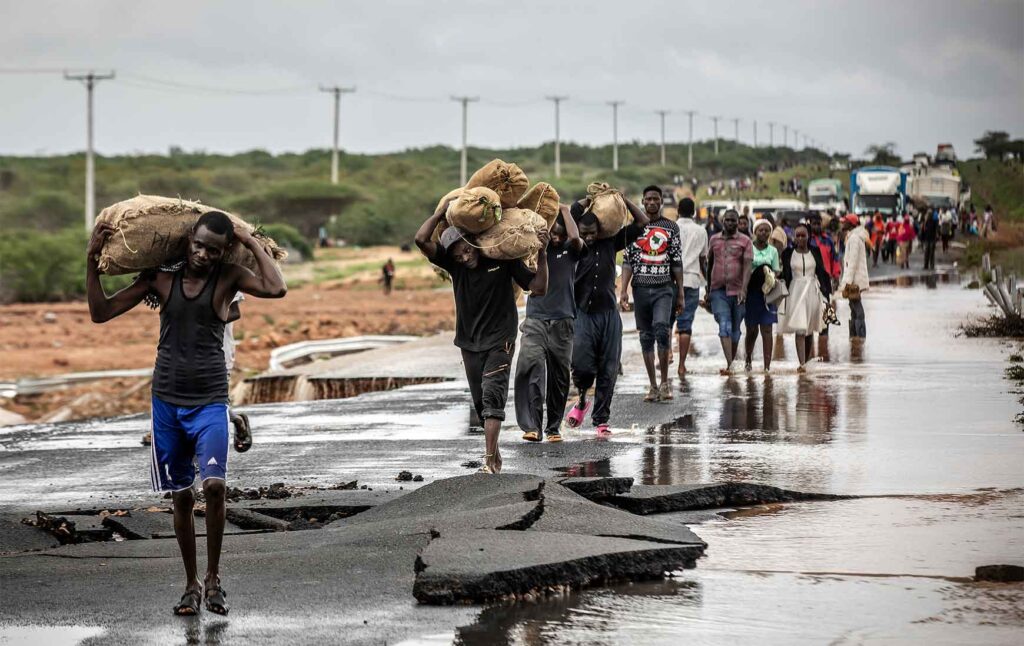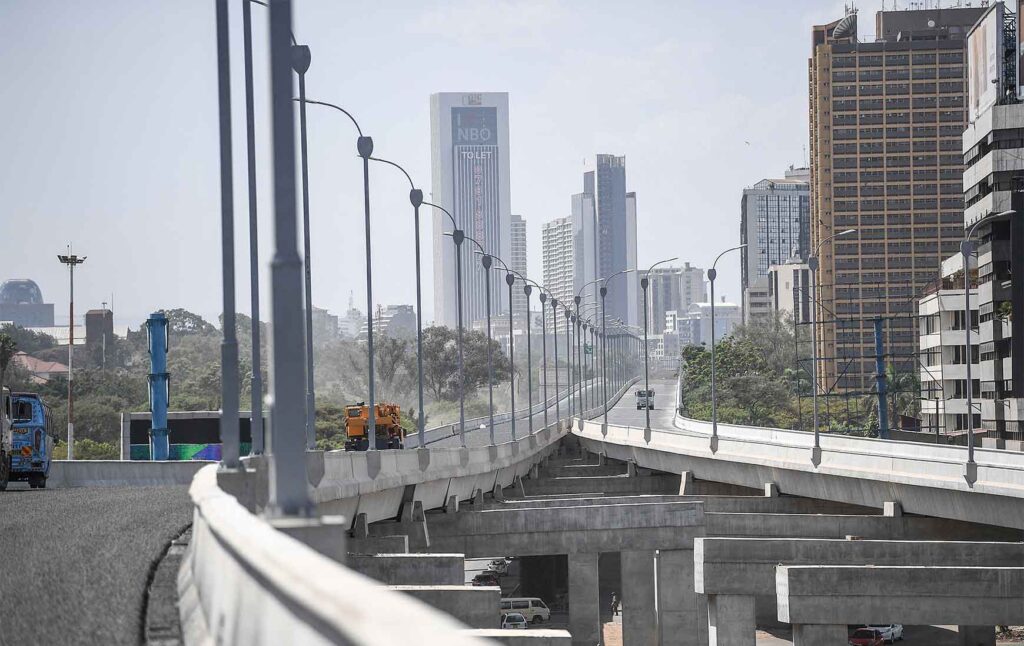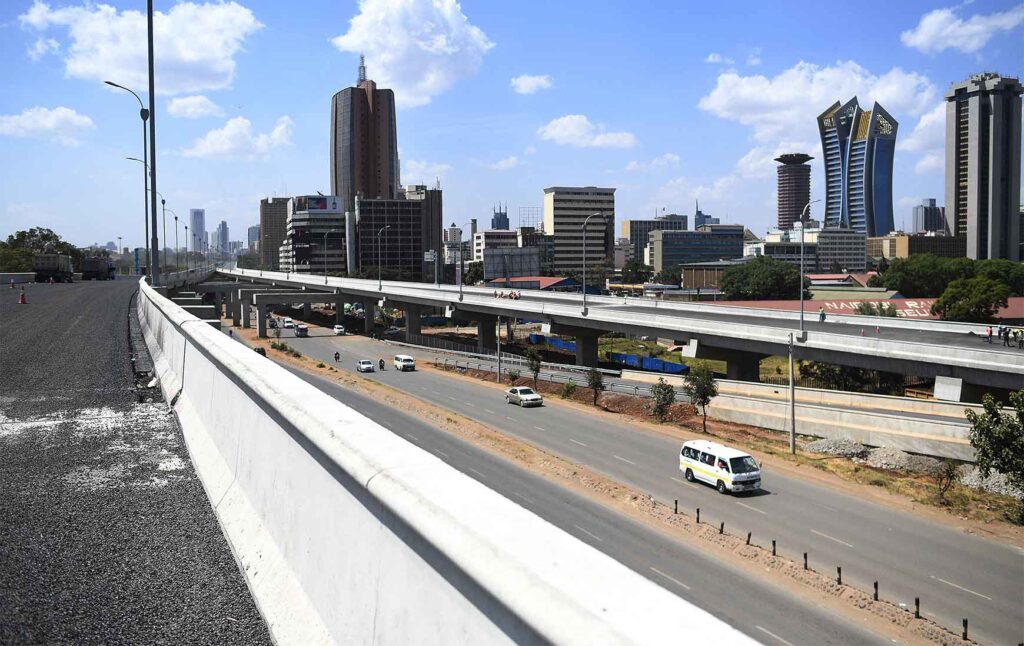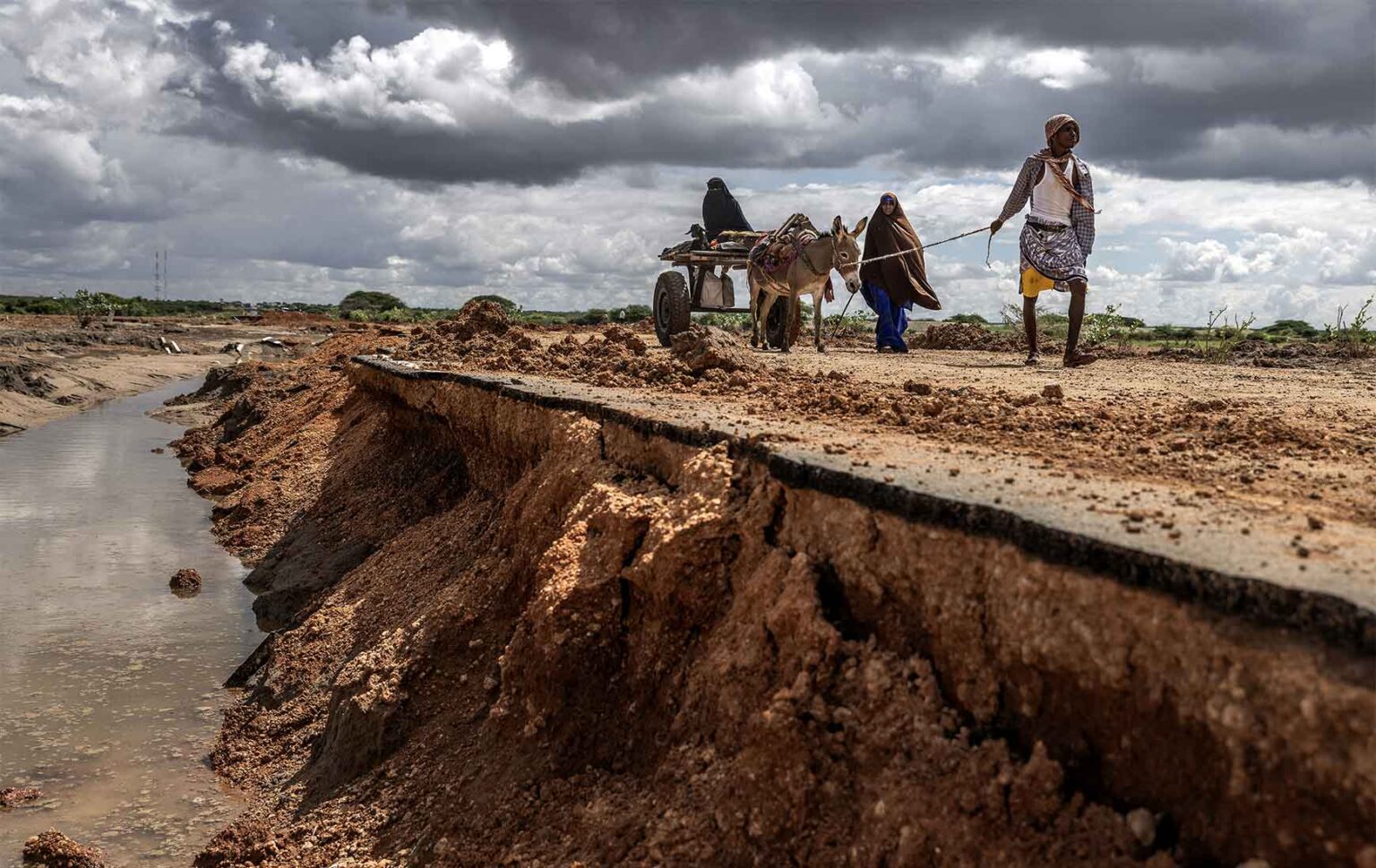A group of construction workers discussing Kenya’s President William Ruto’s administration’s aggressive taxation campaign swiftly brings up the issue of corruption, which they believe has eroded people’s trust in the government, led to inadequate service delivery, and generated poverty in the country, where the gap between the richest and poorest has reached extreme levels.
“These people have been collecting billions of shillings in tax every year in the past six decades, but service delivery remains poor because all that money goes into people’s pockets,” a man identified as John Omondi says. “Look at the state of the roads in our townships and villages, especially now that is raining heavily. The people who were killed by flooding, it’s the result of living in inadequate housing and areas lacking proper infrastructure,” Omondi adds.

“Nothing seems to be working in this country,” complains Alfred Musya. “Bandits are making our lives a living hell, uncollected waste is littered all over the place, community healthcare centres are in a mess, and the cost of life keeps rising.
“And instead of fixing these issues, Ruto and his yes-men continue to increase taxes to make us poorer than ever.”
Another worker, probably a supporter of the ruling party, joins the conversation, pleading with his comrades not to solely crucify Ruto for Kenya’s endless social problems.
“The people that you should be criticising are the MCAs [members of county assemblies] who, instead of maintaining close contact with the electorate on issues affecting the grassroots, just disappear after the elections only to reappear five years later during the next election campaign,” the man, who does not wish to be identified, says.

These disgruntled construction workers may not have expert knowledge of fiscal policies but like many Kenyans, they are all too familiar with the country’s continuously inadequate service delivery despite a wave of decentralisation initiatives undertaken in the past decade.
Kenya’s Constitution of 2010 set out a devolution process that established electoral, horizontal, and direct accountability mechanisms at the county level, and specifically assigned 14 functions to counties. In 2019, the World Bank hailed Kenya’s decentralisation project as among the most rapid and ambitious devolution initiatives in the world.
However, more than a decade down the line, co-authors Abdu Muwonge, Timothy Stephen Williamson, Christine Owuor, and Muratha Kinuthia, in a 2022 assessment, Making Devolution Work for Service Delivery in Kenya, were critical about the mixed results devolution had had on service delivery, writing that ambiguities still existed around financing and service provision.
Michael Juma, a devolution and community development practitioner, told Africa in Fact that corruption was a deeply rooted problem, which was one of the reasons that county governments were yet to fully deliver on their functions as contemplated in Kenya’s constitution.
“Some of the problems that have hindered country governments’ effective performance and service delivery are internal to them and others external, and corruption leads the internal problems,” Juma said. “Corruption is deeply rooted in the counties. The Auditor General has flagged this problem in all counties in annual reports and has continued due to weak political commitment to fight the vice.”

“Sometimes it seems [as if] county governments are run by criminals, and the growing culture of integrating corruption in policy, planning, and budgeting processes is even more worrying. Corruption in procurement has also risen steadily, and state and county officials have established outfits, which they use to do business with the government.”
Juma said genuine businesses, meanwhile, were becoming extremely cautious about doing business with the government due to non-payment for services rendered. The Nairobi-based local governance expert said this was the biggest problem at county level, making county governments “hated and lowly rated” by citizens.
According to Jean Bossuyt, senior executive and head for inclusive governance and accountability at the European Centre for Development Policy Management (ECDPM), corruption constitutes a flaw of decentralisation and devolution processes in many places across the globe.
“In 2022, our foundation led a major evaluation of EU efforts to support the rule of law and the fight against corruption – with Kenya as a case study. There, we could see how limited investments were made so far to foster the rule of law in all proceedings of local authorities,” he said.
Bossuyt pointed out that devolution itself does not create conditions for effective and accountable governance.
“Kenya’s 2010 Constitution and the subsequent devolution changed the formal rules of the game, which constitutes a major jump forward from centralised systems, from where national elites could orchestrate what happened at the local level,” he said.

“But, as in other countries on the continent, the informal rules did not change overnight [with devolution], which explains the predominance of patronage politics at local level [as well] and the well-entrenched culture of poor accountability towards citizens (coupled with impunity, for instance, for corruption) in Kenya.”
Bossuyt said most decentralisation/devolution processes across the world were essentially political processes about the distribution of power and control over resources, and not primarily oriented towards better service delivery or local economic development (except in the discourse).
“Therefore, getting better services and accountability is proving to be a ‘struggle’, which needs a wide range of local and other actors to challenge existing power relations (which devolution often masks) and demand better governance using a variety of tools, mechanisms, approaches.
“You cannot have a local democracy without local democrats who are also interested in public affairs and willing to engage,” Bossuyt said. “This rebalancing of powers for a more inclusive and accountable system of local governance will be an uphill struggle, as is the case in Kenya, and requires time as well as support from different angles to foster a different culture of governance.”
Juma also pointed out to Africa in Fact that other internal factors were hampering Kenya’s county governments’ ability to perform effectively and provide quality service delivery. These included a bloated workforce, which takes more resources at the expense of development; the low completion rate of projects; poor performance in own-source revenue collection and management; and political domination and manipulation of planning and budgets.
“This has culminated in a process where the implementation of development projects and services are often not properly aligned with citizens’ priorities,” he explained.

As for external problems, Juma said these included persistent delays in the transfer of an equitable share of the nationally collected revenue to county governments, delays in unbundling, costing, and transferring their constitutional functions to county governments, and a growing inclination of national government to perform country government functions.
Juma mentioned housing and roads as two examples of bickering between Kenya’s national and country governments.
“It depends on the classification of the roads,” he told Africa in Fact. “National government entities like Kenya National Highways (KENHA), the Kenya Rural Roads Authority (KERA) and the Kenya Urban Roads Authority (KURA) are responsible for major roads and international trunk (roads) as well as those leading to major urban areas as well as to regions of the country. This responsibility includes related facilities, including public lighting.
“Counties, on the other hand, are responsible for county roads, for example, those in the estates and streets, and their related services such as lighting. The challenge is that national government entities like KURA and KERA have been performing some of these functions and have retained the related funds to the detriment of county governments. It is unconstitutional, hence the contest over the transfer of functions to county governments. This is one of the key problems facing devolution.”
Bossuyt told Africa in Fact that for local governance to work well in Kenya and provide quality service delivery, the country needed, among other measures, to invest in civil education to educate citizens about their rights, foster inclusive governance, both the process and outcomes, strengthen existing accountability mechanisms, try innovative approaches, and institutionalise rule of law principles in the conduct of local affairs.
According to Juma, devolution in Kenya will work properly only if citizens are empowered through deliberate and continuous civic education to engage meaningfully to claim their sovereign rights as stipulated in the Kenyan Constitution. “All we need in Kenya is the strict implementation of the relevant constitutional and legal provisions, which only citizens can push for. The problem is that the government (national and counties) have not prioritised civic education and citizen empowerment,” Juma said. “Instead, this critical function has been led by civil society organisations, which rely largely on donor funding for their programmes, and they have been heavily affected by funding shortfalls.”

Kinshasa-born Issa Sikiti da Silva is an award-winning freelance journalist. Winner of the SADC Media 2010 Awards in the print category, he has travelled extensively across the African continent. He lived in South Africa for 18 years, where he worked for 10 years as a journalist before leaving for West Africa, and later to East Africa, to work as a foreign correspondent. He is currently based in Nairobi, Kenya.



